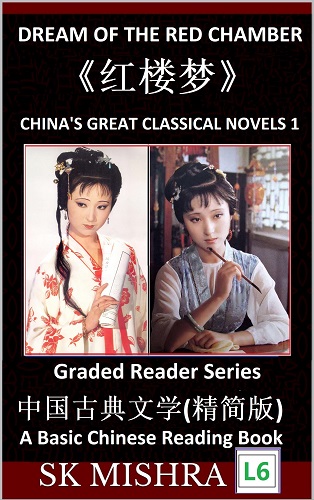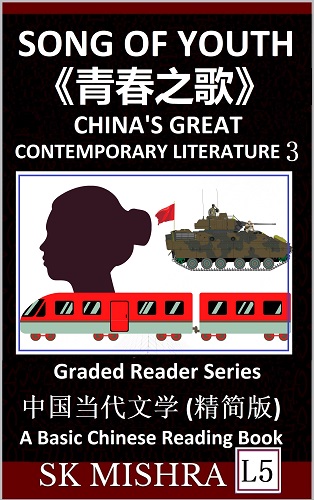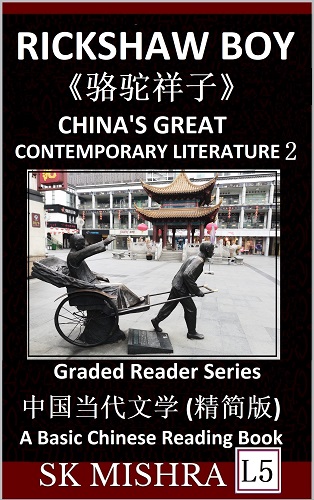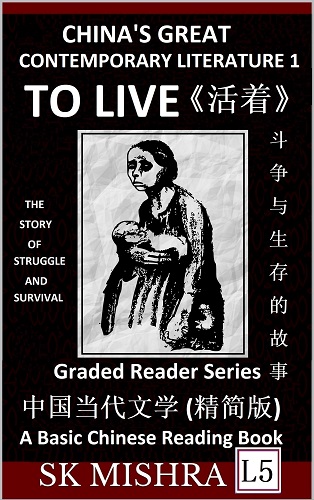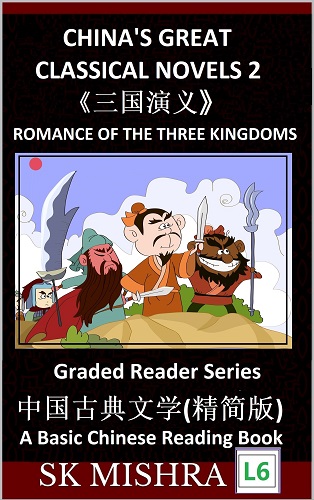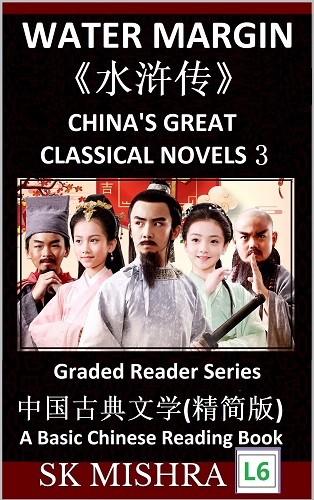I’ve often emphasized that learning Mandarin Chinese language is a lot about learning Chinese culture. In fact, Chinese culture is a broad concept that includes a diverse set of elements like language, food, history, literature, songs, music, etc. Well, Chinese history is about 5000 years long. A lot has happened in China since the time immemorial. As such, a lot can be learned from China’s vibrant past. So, when you are learning Mandarin, make sure to familiarize yourself with Chinese cultural heritage (at least a basic understanding is necessary).
In this blog-post, I’ll be recommending you a list of Chinese reading practice books from the Chinese classic literature (中国古典文学). These books, very important part of China’s literary tradition, are aimed at the advanced level Chinese learners (Level 5/6). Gaining at least a basic sense of these literary masterpieces is indispensable for your Mandarin Chinese endeavors. So, all of these books are absolutely recommended to the Chinese language enthusiasts.

Again, if you are totally new to the whole concept of Mandarin Chinese language learning, you are recommended to start with the Level 1 books. Here are a couple of links for the beginners (to learn Chinese characters and words):
Learn Chinese Language and Culture
After you feel a bit comfortable with basic characters, hit the Chinese language books. The more books you read, the more characters you can remember. Here are the links for books for different levels of Chinese learners:
- Level 1: Chinese Reading Books (Chinese Elementary/Primary School Education Series)
- Level 1: Chinese Reading Books (Chinese Short Story Series, 500+ characters)
- Level 1: Chinese Reading Books (Journey to the West Series, 600 characters)
- Level 2: Chinese Reading Books (Biographies of China’s Famous Personalities, 600 characters)
- Level 2: Chinese Reading Books (Chinese Reading Comprehension, 600+ characters)
- Level 2: Chinese Reading Books (Chinese History Series, 900 characters)
- Level 3: Chinese Reading Books (Chinese Culture Series, 1000 characters)
- Level 4 & 5: Chinese Reading Books (Chinese Geography and Economy Series, over 1000 characters)
- Level 6: Chinese Reading Books (Chinese Classical Literature Masterpieces, about 1300 characters)
Without further delay, let me take you to the Level 5/6 Mandarin reading practice books (simplified characters with pinyin). You may also want to check out the author’s home page. For readers in Japan, please click here Amazon Japan.
Level 6: Classical Novels of Chinese Literature Series
Level 5: Contemporary Novels of Chinese Literature Series
Song of Youth: China’s Great Contemporary Literature 3
- Paperback (ISBN 9798887341019): Amazon
- Paperback (ISBN 9798887341019): Barnes & Noble
China’s Great Contemporary Literature 2: Rickshaw Boy (Camel/Luotuo Xiangzi)
The novel, Rickshaw Boy, also known as Camel Xiangzi/Luotuo Xiangzi (骆驼祥子), is a contemporary literary masterpiece written by the Chinese novelist, Lao She/Shu Qingchun (老舍/舒庆春, 1899-1966). The novel describes the tragic fate and exploitation of rickshaw pullers during the period of social unrest and turmoil in the 1920s (before the revolution of 1949). Specifically, “Camel Xiangzi” tells the life experience of a young, strong and enthusiastic rickshaw driver, Xiangzi (祥子), in China’s Peiping City (name of Beijing 1928-1949, 中国北平城). In fact, Xiangzi is a representative of the working masses of the old Chinese society. Xiangzi, coming from the countryside, is a bankrupt young farmer. He is hardworking, simple, kind and always eager to buy his own rickshaw with honest labor. To be an independent rickshaw puller is Xiangzi’s wish, hope, and even religion. With hard work and perseverance, he spent three years saving money, and finally realized his goal and became a self-supporting rickshaw puller. However, just six months after pulling, the rickshaw was destroyed. Xiangzi was not discouraged, and again started stubbornly from the beginning, and started to save money. However, all his savings were blackmailed and looted by selfish people he trusted the most.
- Paperback (ISBN 9798887341002): Amazon
- Paperback (ISBN 9798887341002): Barnes & Noble
China’s Great Contemporary Literature 1: To Live/Alive
To Live (Alive, 活着), one of the writer Yu Hua’s (余华) masterpieces (代表作), narrates the sufferings of Xu Fugui (徐福贵) in the context of an era that witnessed the civil war (内战), Three-anti and Five-anti Campaigns (三反五反运动), the Great Leap Forward (大跃进), the Cultural Revolution (文化大革命) and several other social changes. Xu Fugui and his family continued to suffer through to the end. In fact, all relative left him successively, leaving only the old man and an old cow to live together. As such, “To Live” tells the story of a person’s life. This is a life testimony of an old man who has experienced the vicissitudes and sufferings of the world. It is a drama that interprets the sufferings of life. The novel’s narrator “I” gained a leisurely career when he, at a young age, went to the countryside to discover folk songs. In that just arrived summer season, “I” met the old man named Fugui, and listened to him talk about his bumpy life experiences.
Yu Hua won the French Order of Arts and Literature (法国艺术及文学勋章) award for this novel in March 2004.
- Paperback (ISBN 9798887340999): Amazon
- Paperback (ISBN 9798887340999): Barnes & Noble
Level 6: Classical Novels of Chinese Literature Series
China’s Great Classical Novels 2: Romance of The Three Kingdoms
Romance of The Three Kingdoms (三国演义), originally written about 600 years ago by Luo Guanzhong (罗贯中, 1330 AD – 1400 AD), a pioneering work of historical romance novels, is one of the four classic novels of Chinese literature. It is also first literary novel and the first Zhanghui (章回) style novel in the history of the Chinese literary tradition (in the Zhanghui style of traditional Chinese novel, each chapter is headed by a couplet providing the essence of the corresponding text). The novel narrates the period of Chinese history of nearly a hundred years from the end of the Eastern Han Dynasty (东汉, 25 AD – 220 AD) to the beginning of the Western Jin Dynasty (西晋, 266 AD – 316 AD). It mainly describes the wars and battles among the heroes in the late Eastern Han Dynasty (东汉末年) and the political and military struggles among the Wei (魏), Shu (蜀), and Wu (吴) Kingdoms (三国). In the end, Sima Yan (司马炎) unified the three kingdoms and established the Jin Dynasty (晋朝). The story thoroughly reflects the transformation of various social struggles, contradictions in the era of the Three Kingdoms and summarizes the historical changes of the contemporary era shaping a group of heroic figures of the Three Kingdoms.
- Paperback (ISBN 9798887341118): Amazon
- Paperback (ISBN 9798887341118): Barnes & Noble
China’s Great Classical Novels 1: Dream of the Red Chamber
Dream of the Red Chamber (红楼梦), also known as Story of the Stone (石头记), written in the mid-18th century by the Qing Dynasty (清朝) writer Cao Xueqin (曹雪芹), is one of the Four Great Classical Novels of Chinese Literature (四大名著). The novel, essentially an art fiction, narrates the rise and fall of the four big families Jia (贾), Shi (史), Wang (王) and Xue (薛). In the background, the novel portrays love triangle of the wealthy son Jia Baoyu (贾宝玉) with his female cousin Lin Daiyu (林黛玉) and wife Xue Baochai (薛宝钗). The romance and love tragedy between Jia Baoyu and Lin Daiyu forms one of the main threads of the book. The novel is often regarded as the greatest novels of Chinese literature. In fact, “Redology” is the term used to describe studies devoted to this novel. As such, understanding this masterpiece is indispensable for learning Chinese language and culture.
- Paperback (ISBN 9798887341101): Amazon
- Paperback (ISBN 9798887341101): Barnes & Noble
China’s Great Classical Novels 3: Water Margin/Outlaws of the Marsh/Shuihuzhuan
Water Margin (水浒传), one of the four Chinese classics (四大名著), is a chapter-style (章回体) novel compiled by Shi Nai’an (施耐庵) in the late Yuan and early Ming Dynasty (元末明初). The 14th-century Chinese novel, also known as Outlaws of the Marsh/Shuihuzhuan, mainly describes the story of 108 bandit-heroes, headed by Song Jiang (宋江), gathered in Liangshan, Shandong (山东梁山) in the late Northern Song Dynasty (北宋末年).
- Paperback (ISBN ): Amazon
- Paperback (ISBN ): Barnes & Noble
I will regularly update the list, so do stop by, at least once in a while!
To sum up, Mandarin Chinese is arguably one of the most difficult languages to learn. However, if you learn smartly, you can indeed learn Chinese much faster. Although the road to learning Chinese is certainly not an easy one, it’s absolutely worth it!
Once you have done enough reading practices, you will be able to read any random piece of Chinese manuscript.
That’s all in this post about How to Learn Chinese Culture by Reading Practice Books. If you have any question about learning Mandarin Chinese, traveling, living or working in China, do let me know in the comments! Feel free to post in our forum so that others could also contribute and learn. For regular updates like us on Facebook, or follow on Twitter!
If you find the write-ups useful, don’t forget to buy me a beer!
Wish you a great time learning Mandarin Chinese!
Cheers!
Last updated: Friday, December 16, 2022
